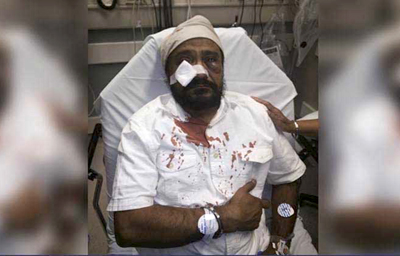New York, Oct 8: A 41-year old Sikh-American IT specialist was brutally attacked by some men, who knocked off his turban and allegedly cut his religiously-mandated unshorn hair with a knife, prompting a civil rights organisation to demand a hate crime investigation into the incident.
 Maan Singh Khalsa, a father and IT specialist in California, was driving home on the night of September 25 when a group of men in car threw a beer can at his vehicle.
Maan Singh Khalsa, a father and IT specialist in California, was driving home on the night of September 25 when a group of men in car threw a beer can at his vehicle.
"Khalsa drove away from the scene but the men followed him and assaulted him through his open car window, knocking off his Sikh turban and hitting his face repeatedly," according to a statement from The Sikh Coalition, the nation's largest Sikh civil rights organisation.
Khalsa said there were "five to six white males in their late 20s to early 30s" who abused him and three of them then attacked him physically.
Shouting that Khalsa's hair should be cut off, the men pulled his head out of the window, and cut a fistful of his religiously-mandated unshorn hair with a knife, the complaint alleged. Khalsa sustained injuries to his fingers, hands, eye and teeth.
The Sikh Coalition has written to the Richmond Police Department and the Contra Costa County District Attorney's Office on behalf of Khalsa, urging authorities to conduct a hate crime investigation and prosecution in the case.
"The attackers caused physical injuries and deep harm when they targeted my Sikh faith," Khalsa said in a press statement released by the Sikh Coalition."I urge a thorough investigation so we can address the tide of violence and bigotry in this country."
Sikh Coalition Legal Director, Harsimran Kaur urged authorities to fully investigate "this hateful attack" on Khalsa and his Sikh identity.
"The purpose of a hate crime investigation and prosecution is to ensure that our government and communities accurately account for the problem of bias in our society," Kaur said.
The Sikh Coalition said that in the 15 years that have followed 9/11, Sikhs remain hundreds of times more likely to be targeted in cases of profiling, bigotry and backlash than the average American.
"We need to acknowledge hatred so that we commit the resources necessary to stem bias-based violence," Kaur said.
b





Comments
Add new comment